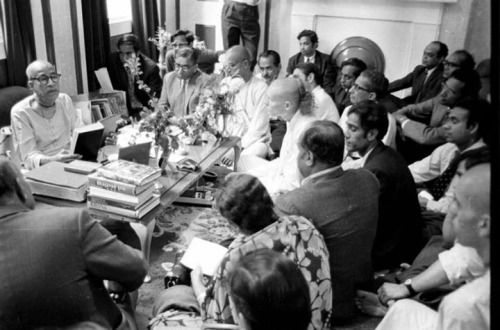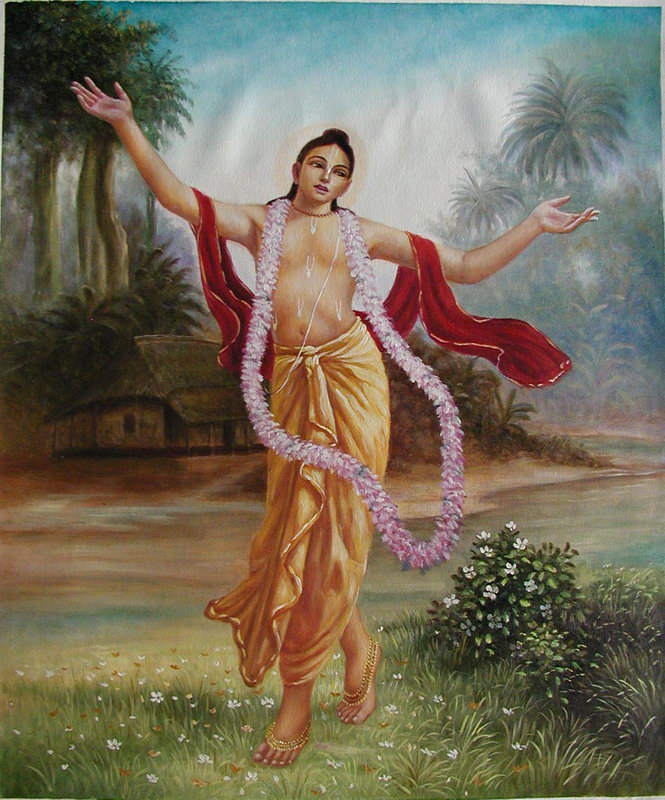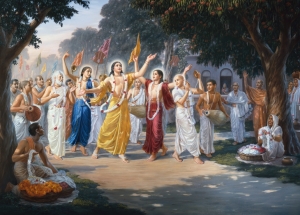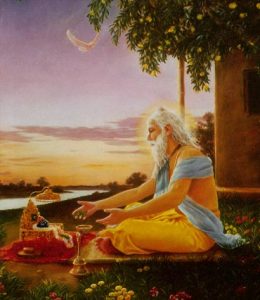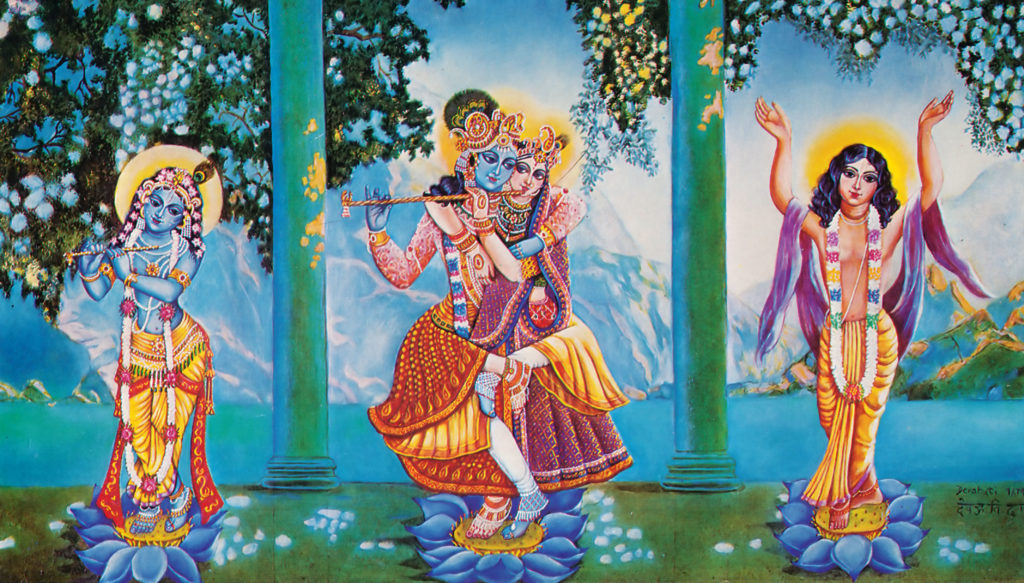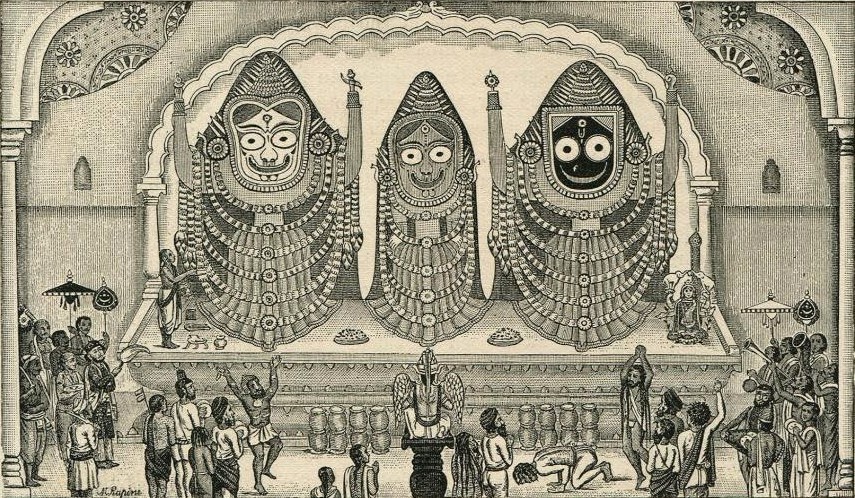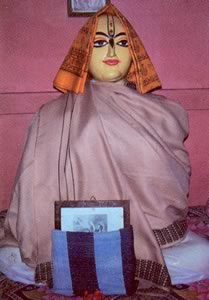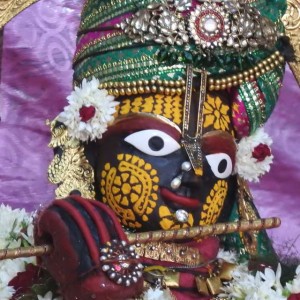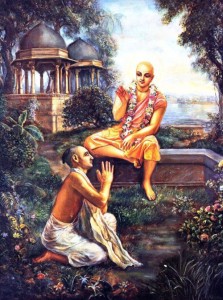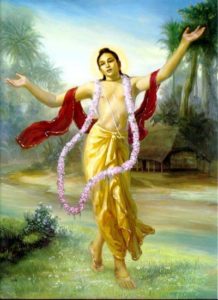
Hare Krishna dear devotees,
Today is the most auspicious Gaura Purnima, appearance day of Sri Caitanya Mahaprabu.
Krishna says in Bhagavad Gita 4.9
janma karma ca me divyam evaṁ yo vetti tattvataḥ
tyaktvā dehaṁ punar janma naiti mām eti so ’rjuna
One who knows the transcendental nature of My appearance and activities does not, upon leaving the body, take his birth again in this material world, but attains My eternal abode, O Arjuna.
So Krishna is saying that if we know Krishna, or His actions, in tattva then we will not take birth again. The dictionary meaning of tattva is ‘principle’, ‘reality’ or ‘truth’. It sounds too simple but it is a very deep topic. Those who do get to understand Krishna in tattva their life completely changes, their consciousness and the very purpose of being will change. As this has not happened to many of us, specially true for my own poor self, that would imply that we do not know Krishna in tattva. That is why Srimad Bhagavatam first introduces all the incarnations so that step by step we will reach towards Krishna and then understand His position, His pastimes in tattva. Now if this is true for Krishna then we can understand how difficult it is to understand the position of Mahaprabhu. He is described as a ‘channa avatara’, hidden incarnation, in the scriptures. But if we do become fortunate to understand Mahaprabhu in tattva then as per the above Bhagavad Gita verse we will not take a birth again because there is no difference between Krishna and Mahaprabhu.
So in this auspicious day I am sharing some part of ‘Gaura Tattva’ from a book called Gaudiya Kanthahar which is a compilation of choicest verses from various Upanishad, puranas, Mahabharat, etc. on topics like Guru tattva, Krishna tattva, jiva tattva , maya tattva, etc, by Sri Atinddriya Das Adhikari a disciple of Srila Bhaktisidhanta Saraswati Thakura. His compilation was mainly from the writings of his guru maharaj Srila Bhaktisidhanta Saraswati Thakura, who, when presented with this book, was extremely pleased with this compilation. I hope this will nurture our devotional life and help us understand Sri Caitanya Mahaprabhu in tattva.
Gaura-tattva
The Evidence From Sruti for Lord Caitanya
mahan-prabhur vai purusah sattvasyesa pravarttakah
surnimalam imam santimisano jyotiravyah
The Personality of Godhead, Shri Caitanya Mahaprabhu, is brilliantly effulgent and imperishable like molten gold. He is the Supreme Controller. He controls the mode of goodness and through saokirtana bestows spiritual intelligence on the living beings. In the guise of a sannyasi, He is the source of spiritual purity and of liberation. He is therefore known as “Mahaprabhu”. (Svetasvatara Upanisad 3.12)
yada pasyah pasyate rukma-varnam kartaram isam purusam brahma-yonim
tada vidyan punya-pape vidhuya niranjanah paramam samyam upaiti
When one realizes the golden form of Lord Gauranga, who is the ultimate actor and the source of the Supreme Brahman, he attains the highest knowledge. He transcends both pious and impious activities, becomes free from worldly bondage, and enters the divine abode of the Lord. (Mundaka Upanisad 3.3)
Evidence From Bhagavatam for Lord Caitanya
krishna-varnam tvisakrishnam sangopangastra-parsadam
yajnaih saokirtana-prayair yajanti hi su-medhasah
In the age of Kali, Krishna appears in a golden form, chanting the two syllables krs-na. He descends along with His weapons, limbs, saktis, and eternal confidential associates. Those with intelligence worship Him with the saokirtana yajna. (Bhag. 11.5.32)
‘krishna’ ei dui varna sada yaora mukhe athava, krishnake tioho varne nija sukhe.
krishna-varna-sabdera artha dui ta pramana krishna vinu taora mukhe nahi aise ana.
deha-kantye haya teoho akrishna-varana akrishna-varane kahe pita-varana.
The two syllables krs-na are always in His mouth, or He always describes Krishna with great pleasure. These are two meanings of the words “krishna varna.” Indeed, nothing but Krishna issues from His mouth. If someone tries to describe Him as blackish, the next adjective, tvisakrishnam, immediately restricts him. His complexion is certainly not blackish. Indeed, His not being blackish indicates a golden complexion. (Cc. Adi 3.54,55,57)
asan varnas trayo hy asya grhnato ‘nuyugam tanuh
suklo raktas tatha pita idanim krishnatam gatah
This boy, Krishna, has three other colors: white; red, and yellow, as He appears in different ages. Now, in this Dvapara-yuga, he has appeared in a transcendental blackish color. (Bhag. 10.8.13)
ittham nr-tiryag-rsi-deva-jhasavatarair lokan vibhavayasi hamsi jagat-pratipan
dharmam maha-purusa pasi yuganuvrttam channah kalau yad abhavas tri-yugo ‘tha sa tvam
[Prahlada said] O Krishna, in this way You appear in various incarnations: as a human being, an animal, a great saint, a demigod, a fish, or a tortoise, thus maintaining the entire creation in different planetary systems. In this way, according to the age, You protect the principles of religion, but, O Mahaprabhu, in the age of Kali, You do not assert Yourself as the Supreme Personality of Godhead. Because Your incarnation is hidden in the age of Kali You are known as Triyuga, or the Lord who manifests His supremacy in only three ages. (Bhag. 7.9.38)
Evidence From Mahabharata for Shri Caitanya
suvarna-varno hemango varangas-candanangadi
sannyasa-krcchamah santo nistha-santi-parayanah
When Krishna appears as Lord Gauranga, in His early pastimes His complexion is golden (suvarna-varna), His limbs are the color of molten white gold (hemanga), His body is extremely beautiful (varangas), and He is decorated with sandalwood pulp (candanangadi). Shri Caitanya accepts sannyasa (sannyasa-krt), and shows equanimity (sama). He is peaceful (santa). His mind is always fixed on Krishna, and thus He is nistha, or fixed, in performing the great sacrifice of the holy name of Krishna. He silences the non-devotees and impersonalists who are opposed to the service of the Lord, by promoting the cause of devotion. Thus He distributes real peace. He is therefore an abode of the highest spiritual peace and devotion. (Mahabharata, Dan-dharma ch.149)
The Version of the Gosvamis
antah krishnam bahir-gauram darsitangadi-vaibhavam
kalau saokirtanadyaih smah krishna-Caitanyam-ashritah
I take shelter of Shri Krishna Caitanya Mahaprabhu, who is Krishna Himself, thinking of Himself. He is internally Krishna blackish but externally, he appears in golden complexion. In this age of Kali, Krishna appears as Krishna Caitanya, simultaneously manifesting His eternal associates, opulences, expansions, and incarnations. In this way, he preaches the process of Krishna consciousness by performing saokirtana. (Tattva-sandarbha 2)
Sri Gauranga is the Source of all Avataras
sutiya acchinu ksira-sagara-bhitare
mora nidra bhanga haila nadara huokare
[While sitting on the altar of Vishnu in the house of Shrivasa, Lord Caitanya said] Lying within the ocean of milk, My transcendental slumber broke, as I awoke to hear the loud cries of My devotees, thus I [Lord Vishnu] have come [as Lord Caitanya]. (Cb. Madhya 22.16)
Lord Caitanya’s sixfold Nature
sakala vaishnava, suna kari’ eka-mana Caitanya-krsnera sastra-mata-nirupana.
krishna, guru, bhakta, sakti avatara, prakasa krishna ei chaya-rupe karena vilasa
I advise all my Vaishnava readers to read and hear with rapt attention this narration of the pastimes of Lord Krishna Caitanya as inculcated in the revealed scriptures. Lord Krishna enjoys His pastimes by manifesting Himself as the spiritual masters (guru), His devotees (bhakta), His diverse energies (sakti), His incarnations (avataras) and His full expansions (prakasa). (Cc. Adi 1.31,32)
Lord Caitanya is the Jagad-guru
caudda bhuvanera guru Caitanya-gosani
taora guru anya, ei kona sastre nai
Sri Caitanya Mahaprabhu is the jagad-guru, the spiritual master of the fourteen worlds. No other guru can compare with Him. (Cc. Adi 12.16)
Lord Gauranga is the Best of all
saundarye kama-kotih sakala-jana samahladane candrakotir
vatsalye matrkotis tridasavitapinam kotir audarya-sare
gambhirye ‘mbodhi-kotir madhurimani sudha-ksira-maddhavihvika-kotir
gaurodevah sa jiyat pranaya-rasapade darsitascarya-kotih
Caitanya Mahaprabhu is lovelier than millions of cupids. He is mellower than millions of moons, dearer than millions of mothers, kinder than millions of wish-fulfilling trees, deeper than millions of oceans, and sweeter than millions of nectarean drinks. All glories to Shri Caitanya Mahaprabhu, the Supreme Lord, who displays millions of amazing sentiments of madhurya-bhakti, the most exalted mellow of pure love of Godhead. (Caitanya Candramrta 101)
Gauranga’s Tattva, Nama, Rupa, and Lila
namo maha-vadanyaya krishna-prema-pradaya te
krishnaya krishna-Caitanya-namne gaura-tvise namah
His nature (tattva) is that He is Krishna Himself. His name (nama) is Krishna Caitanya. His form (rupa) is golden. His quality (guna) is that He is the most magnanimous of all incarnations. His pastime (lila) is to distribute the highest love of Godhead krishna-prema. I offer my obeisances unto that most generous Lord, Shri Krishna Caitanya Mahaprabhu. (Cc. Madhya 19.53)
Gauranga Delivers All by Distributing Nama
saokirtana-pravartaka shri-krishna-Caitanya saokirtana-yajne taore bhaje, sei dhanya.
sei ta’ sumedha, ara kubuddhi samsara sarva-yajna haite krishna-nama-yajna sara
Caitanya Mahaprabhu inaugurated the saokirtana movement. One who worships Him through saokirtana is fortunate indeed. Such a person is truly intelligent, whereas others, who have but a poor fund of knowledge, must endure the cycle of repeated birth and death. Of all sacrificial performances, the chanting of the Lord’s holy name is the most sublime. (Cc. Adi 3.77,78)
Gauranga is the Giver of Krishna-prema
uchalila prema-vanya caudike vedaya stri, vrddha, balaka, yuva, sabare duvaya.
saj-jana, dur-jana, pangu, jada, andha-gana prema-vanyaya dubaila jagatera jana
The flood of love of Godhead distributed by Shri Caitanya Mahaprabhu swelled in all directions. Young men, old men, women, and children were all immersed in that inundation. The Krishna consciousness movement begun by Shri Caitanya Mahaprabhu will inundate the entire world and drown everyone, whether one be a gentleman, rogue, lame, invalid, or blind. (Cc. Adi 7.25,26)
patrapatra-vicara nahi, nahi sthanasthana yei yanha paya, taoha kare prema-dana
lutiya, khaiya, diya, bhandara ujade ascarya bhandara, prema sata-guna bade
In distributing love of Godhead, Lord Caitanya Mahaprabhu and His associates did not consider who was fit and who was unfit, nor where such distribution should or should not take place. They made no such conditions. Rather, wherever they got the opportunity, the members of the Panca-tattva distributed love of Godhead. Although they plundered the storehouse of love of Godhead, ate and distributed its contents, there was no scarcity, for this wonderful storehouse is so complete that as the love is distributed, the supply increases hundreds of times. (Cc. Adi 7.23,24)
One can Know the Conclusion of Scripture by Shri Gauranga’s Mercy
shri-Caitanya-prabhum vande balo ‘pi yad-anugrahat
taren nana-mata-graha-vyaptam siddhanta-sagaram
I offer my obeisances unto Shri Caitanya Mahaprabhu, by whose mercy even an ignorant child can swim across the ocean of conclusive truth, which is filled with the crocodiles of various theories. (Cc. Adi 2.1)
Lord Gauranga’s Preaching Pastimes
sannyasi pandita-ganera karite garva nasa
nica-sudra-dvara karena dharmera prakasa.
‘bhakti’, ‘ prema’, ‘tattva’ kahe raye kari’ ‘vakta’
apani pradyumna-misra-saha haya ‘srota’.
haridasa-dvara nama-mahatmya-prakasa
sanatana-dvara bhakti-siddhanta-vilasa.
shri-rupa-dvara vrajera prema-rasa-lila
ke bujhite pare gambhira caitanyera khela?
To vanquish the false pride of so-called sannyasis and learned scholars, He spread real religious principles, even through a sudra. Lord Caitanya preached about devotional service, ecstatic love, and the Absolute Truth by making Ramananda Raya, a grhastha from a low family, the speaker. Then the Lord, an exalted brahmana sannyasi, and Pradyumna Misra, the purified brahmana, both heard from Ramananda Raya. The Lord exhibited the glories of the holy name of Krishna through Haridasa Thakura, who was born in a Muslim family. Similarly, He exhibited the essence of devotional service through Sanatana Gosvami, who was almost converted to Islam. The Lord also fully exhibited the ecstatic love and transcendental pastimes of Vrndavana through Shrila Rupa Gosvami. Considering all this, who can understand the deep plans of Caitanya Mahaprabhu? (Cc. Antya 5.84-87)
vraje ye vihare purve krishna-balarama koti-surya-candra jini doohara nija-dhama.
sei dui jagatere ha-iya sadaya gaudadese purva-saile karila udaya.
shri-krishna-Caitanya ara prabhu nityananda yaohara prakase sarva jagat ananda.
surya-candra hare yaiche saba andhakara vastu prakasiya kare dharmera pracara.
ei mata dui bhai jivera ajnana-tamo-nasa kari’ kaila tattva-vastu-dana.
yaohara prasade ei tamo haya nasa tamo nasa kari’ kare tattvera prakasa.
surya candra bahirera tamau se vinase bahir-vastu ghata-pata-adi se prakase.
dui bhai hrdayera ksali’ andhakara dui bhagavata-sange karana saksatkara.
Krishna and Balarama, who formerly appeared in Vrndavana and who were millions of times more effulgent than the sun and moon, have arisen over the eastern horizon of Gauda-desa, being compassionate on the fallen state of the world. The appearance of Srri Caitanya and Nityananda has surcharged the world with happiness. As the sun and moon drive away darkness and reveal the nature of everything, these two brothers dissipate the darkness of the living beings ignorance and enlighten them with knowledge of the Absolute Truth. By the grace of Sri Caitanya and Nityananda, all darkness is removed and the truth is brought to light. The sun and moon dissipate the darkness of the external world and thus reveal material reality, but these two brothers dissipate the darkness of the inner core of the heart, and thus help one to meet the two kinds of Bhagavatas. (Cc. Adi 1.85-89,95,97,98)
Shri Gauranga is Like a Lion
Caitanya-simhera nava-dvipe avatara simha-griva, simha-virya, simhera huokara
sei simha vasuk jivera hrdaya-kandare kalmasa-dvirada nase yaohara huokare
Thus the lion-like Caitanya Mahaprabhu has appeared in Navadvipa-dhama. He has the shoulders of a lion, the powers of a lion, and the loud voice of a lion. May that lion be seated in the core of the heart of every living being and with His resounding roar, may He drive away their elephantine vices. (Cc. Adi 3.30,31)
Shri Gauranga’s Eternal Reason for Appearing
anarpita-carim cirat karunayavatirnah kalau
samarpayitum unnatojjvala-rasam sva-bhakti-shriyam
harih purata-sundara-dyuti-kadamba-sandipitah
sada hrdaya-kandare sphuratu vah saci-nandana
May that Lord who is known as the son of Shrimati Sacidevi be transcendentally situated in the inner-most chambers of your heart. Resplendent with the radiance of molten gold He has appeared in the age of Kali by His causeless mercy to bestow what no incarnation ever offered before the most sublime and radiant spiritual knowledge of the mellow taste of His service. (Cc. Adi 1.4)
Lord Gauranga’s Confidential Reason for Appearing
shri-radhayah pranaya-mahima kidrso vanayaiva-
svadyo yenadbhuta-madhurima kidrso va madiyah
saukhyam casya mad-anubhavatah kidrsam veti lobhat
tad-bhavadhyah samajani saci-garbha-sindau harinduh
Desiring to understand the glory of Shrimati Radharani’s love, the wonderful qualities in Him that she alone relishes through Her love, and the happiness she feels when she realizes the sweetness of His love, Lord Hari, richly endowed with Her emotions, appears from the womb of Sacidevi as the moon appears from the ocean. (Cc. Adi 1.6)
Internally He has the Mood of Shri Radha, Externally He Preaches the Holy Name
sei radhara bhava lana Caitanyavatara
yuga-dharma nama-prema kaila paracara
Lord Caitanya appeared with the sentiments of Shri Radha. He preached the dharma of this age, the chanting of the holy name of Krishna, and pure love of Godhead (Krishna-prema). (Cc. Adi 4.220)
Gauranga Appears as His Holy Name and as His Deity
ara dui janma ei saokirtanarambhe haiba tomara putra ami avilambe
mora arca-murti mata, tumi se dharani jihvarupa tumi mata, namera janani
ei dui janma mora saokirtanarambhe dui thani tora putra rahu avilambe
[Lord Caitanya told Saci] Birth after birth you are My mother. Again, in this birth, I have come to begin the saokirtana movement, and so I have become your son. My appearance in this world is twofold: I appear as the arca-murti and as the holy name. In this way I appear upon the tongue in the form of sound, and as the Deity made from the elements drawn from the earth. In both these forms I am worshiped, and in these two features I have appeared in order to spread the saokirtana movement. (Cb. Madhya 27.47)
Gauranga’s Teachings in a Nutshell
aradhyo bhagvan brajesa-tanayas-tad-dhama vrndavanam
ramya kacid-upasana vraja-vadhu-vargena ya kalpita
shrimad-bhagavatam pramanam-amalam prema pumartho mahan
shri Caitanya mahaprabhur-matam-idam tatradaro nah parah
It is the conclusive opinion of Lord Caitanya that Shri Krishna, who is Vrajendra-nandana, is the Supreme Personality of Godhead Himself, the topmost worshipable Deity; Vrndavana-dhama which is an expansion of Krishna and is nondifferent from Him is the highest worshipable abode; the gopis are the highest example of the worship of Shri Krishna; Shrimad-bhagavatam is the spotless evidence for knowing the absolute truth; krishna-prema is the fifth and highest goal of life. These are the teachings of Shri Caitanya in a nutshell. (Visvanatha Cakravarti Thakura)
All glories to Sri Guru and Gauranga.
All glories to Srila Prabhupada.
Your servant,
Giriaj dasa
Like this:
Like Loading...
